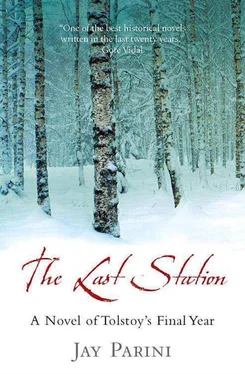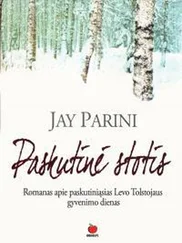Leo Nikolayevich grew delirious toward evening, and the Muscovite doctors insisted on giving him camphor injections, which made his body writhe, briefly, and relax. They put an oxygen balloon – a hideous modern contraption, a torture chamber – over his face. I had to turn my head.
We had trouble, too, with the Church. Leo Nikolayevich symbolized a challenge to their bankrupt dogmas. The Church has mesmerized the people, urging them to follow the tsar’s armies into an endless succession of futile battles. It was obviously in their interest to report that Leo Tolstoy, on his deathbed, had recanted and died in the arms of Mother Church.
A telegram came from the Metropolitan of St Petersburg, begging Leo Nikolayevich to repent. Soon a tedious monk called Father Varsonofy arrived on our doorstep. A comose little creature, his black beard flecked through with white, he reeked of garlic and wine. At first, he pretended to feelings of great sympathy for Tolstoyan ideas, then he tried to wheedle us into letting him see Leo Nikolayevich. ‘I only wish to see him!’ he cried. We told him this was impossible, so he approached Sofya Andreyevna, as if that would improve his chances of an interview! Then Ozolin told me that the bishop of Tula himself had been dispatched to Astapovo by the archbishop of Moscow. Such nonsense.
Sasha handed me a note the monk had written to her. It is a remarkable piece of deception, penned in an ornate hand:
You should be aware that the count told his sister, your aunt, that he wished to speak with a representative of the Church for the sake of his soul’s everlasting peace. He deeply regretted that this wish could not be granted while he was at Shamardino. I beg you, dear lady, with all respect, to inform him of my presence in Astapovo. I will be happy to see him, if for only a few minutes. Should he not want me to hear his confession, I shall return immediately to Optina and let God’s will be done.
I dropped his note into the fire, where it spread its wings slowly before it burst into orange flames.
I recalled a passage from Leo Nikolayevich’s diary of 1901, written in Gaspra during his illness: ‘When I seem on the edge of death, I want to be asked if I still see life as a continuous progression toward God, an increase of love. If I have no strength to speak, and the answer is yes, I shall close my eyes; if the answer, alas, is no, I shall look up.’ It occurred to me that I should ask him that question now, but it did not seem worth the risk.
My dear Leo Nikolayevich seemed close to whatever lay behind the papery veil that separates us from Eternity.
On Saturday evening, his lips turned stony. Blue spots emerged on his cheeks, on his ears and hands. He began to choke, calling in a raspy voice to his doctors, ‘I can’t breathe!’
They gave him further injections of camphor oil, though he continued to object.
‘Foolishness… foolishness!’ he shouted in a hoarse whisper. ‘Stop the injections…. Let me be, for God’s sake!’
Nevertheless, the injections helped. Again, he seemed much calmer almost immediately and sat up in bed. He called for Sergey.
‘My son,’ he said, as Sergey knelt beside him, his ear close to his father’s lips. ‘The truth… it matters so much to me… the way–’ His voice broke, exhausted by the effort, once again, to formulate the truth, to command the whip of language.
He fell asleep, looking quite blissful, at 10:30. I ushered everyone but Makovitsky out of the room.
Perhaps for the first time in his life, Dushan Makovitsky wept.
After four days of silence, eating nothing, drinking only a little water, I wrote to him:
Don’t be afraid, my dear one, that I shall come in search of you. I can hardly move, so weak have I become. I would not force you to return, not for anything. Do what you think is best. Your departure taught me a lesson, a dreadful one, and if I do not die as a result of it, and you come back to me, I shall do anything I can to make things easier for you. Yet I feel, in my bones, that we shall never meet again…. Lyovochka, find the love that’s in you, and know that a great deal of love has awakened in me.
I needed a way to end, a way that would signal my affection, which has never ceased, not for a second: ‘I embrace you, my darling, dear old friend, who once loved me so much. God keep you, and take care of yourself.’
I slept badly that night, in spite of weariness beyond description, dreaming of Lyovochka and our life together. The next morning, before dawn, I went, again, to my writing desk, holding an old portrait of myself and Lyovochka to the candle, watching the flame bring life and color into the ghostly cheeks of ancient silhouettes.
I tried to make a few sentences that would touch him, yet the accusations began to tumble out, and I realized that this would only alienate him further. It was just no use.
A servant knocked on the door while I was writing. She had a telegram from a man called Orlov, a reporter from The Russian Word . ‘Leo Nikolayevich ill at Astapovo. Temperature 104.’
He was dying!
Duty presented itself. I realized I must go to him. He would want to see me, wouldn’t he? Hadn’t we lived together all these years? Hadn’t we brought thirteen children into the world? I did not doubt that, in the end, he would want me near him. He would want to hear and receive my confession, as I would hear and receive his. Whenever he was ill, he was like a child, thirsting for my attention. And I granted it, as I would grant it now, even if he insisted on mocking me, on making public ridicule of our marriage, which had lasted nearly half a century.
I traveled with Tanya, Ilya, Mikhail, and Andrey, taking a nurse, the psychiatric doctor who has been looking after me in the past weeks, and a few servants. One never knows what will happen on such journeys, and it is better to be prepared. We made our way to the station at Tula in several carriages. We had hurried to catch the morning train, but we missed it, obliging me to hire a special train, which cost five hundred rubles!
All day and well into the evening we rode southeast, arriving late that night. As we neared the station where my husband lay dying, I could hardly catch my breath. I felt like an important actress in Moscow who was about to make her farewell appearance to a packed house. I formed a dozen perfect sentences in my head for Lyovochka. His old, soft hands would touch my hair once again, as always. The curtain of death would fall across his eyes. And I would die, too. Affection would never waken in my breast again.
But the horrid facts hit me when I got to Astapovo. Lyovochka was surrounded by his followers, his fanatics, and they would not let me through to him. Sergey had arrived from Moscow on an earlier train and came to us like an ambassador from an enemy country, addressing the family circle like a pompous little prince. He is my own son, but I hated him. It would ‘kill’ his father if he saw me, Sergey said. Was I hearing him correctly?
I was too weak, however, to do otherwise than obey these men, who would force their will upon me now as they always had. Does a woman ever have a chance? Did I ever have a chance with Lyovochka, who used me like an old cow?
Day after day he lay dying, while I lay mostly awake. Now and then the miracle of exhaustion released me, briefly, from my pain. But I could always hear my heartbeat ticking noisily in my temples, in my wrists. My mind was tortured by visions, images of hell.
All the while the cinematographers recorded my grief. The whole world saw but never understood my sorrows.
‘Turn to the right, Countess,’ cried the wretched cameraman Meyer. ‘Show us your eyes, Countess.’ I can still hear them, can see them cranking their machines, my Furies.
Читать дальше












